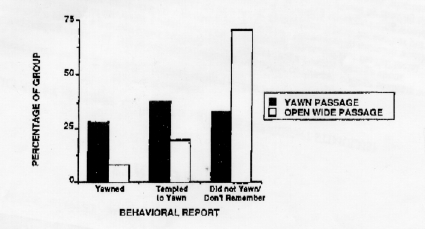Provine
has shown that reading about yawning is a
releasing stimulus or elicitor of yawns: college
students were more likely to report yawning
while reading a passage about yawning than while
reading a control passage about hiccups. Provine
also examined the nature of the visual stimuli
that elicit yawning and suggested that the full
facial configuration is the most potent visual
releaser, more so than a yawning mouth alone. We
whish to examine whether reading about yawning
is a specific releaser of yawning or reading
about opening the mouth for another pupose might
effective as well. Based upon the visual
stimulus data, we hypothesized that the likehood
of eliciting yawns, by reading about yawning
would be unrelated to the individual's level of
interest in the material or level of alertness,
whereas yawning in response to another textual
stimulus might show a relationship to those
factor (boredom and sleepiness)
Methods : While seated in a largte
auditoriem, students enrolled in a course on
sleep and dreaming but naive to information on
yawning were given one of two brief passages to
read, with instructions to "remain absolutely
quiet and do not look around the room" while
reading. A 5-minute reading period was provided,
and students were instructed to re-read the
passage if they finished early. One passage
("Yawn") described yawning and was the passage
previously used by Provine. The second ("Open
Wide") was of equal length, but described
tonsils and tonsillitis in the context of
explaining why a doctor says "open wide and say
ah". Subjects were then requested to answer
questions about whether they yawned, were
tempted to yawn, did not yawn, or could not
remember having yawned. while reading the text.
They also rated their interest level in the
reading and stated how much they had slept the
night before. Responses were completed by 119
students, 61 women and 58 men. ranging in age
from 19 to 26 (mean =2 20.1. S.D. = 1.1) years.
The Yawn text was read by 60 students (31 women,
29 men) and the Open Wide toxi by 59 (30 women,
29 men). No sex differences were found;
therefore, the data were combined across
sexes.
Results : As shown in the figure
students who read the Yawn passage reported
yawning or having been tempted to yawn
significantly more often than those who read the
open Wide passage (chi-square = 17-90;
p<.001), Reprted sleep time was not
significant predictor of yawning in either
gropu. The rported level of intereest in the
reading material was significantly related to
reports of yawning in the gropu who readthe open
wide passage (chi-square = 10,77; p<0,1),
with 12 of 20 who reported low interest (1 or 2
on a 5 point scale) reporting yawning or being
tempted to yawn versus 5 of 31 who reported a
moderate or high level of inyererst (3,4 or( on
the same scale). Level ofinterest was not
significant factor in reports of yawning
behavior of the group who read the yawn
passage.
Discussion : Reading about yawingg was
significantly more likely to elicit yawning
behavior than reading about opernng the mouth
per se. This finding supports the specificity of
the cognitive releasing stimulus for yawning.
Sleep length on the previous night was unrelated
to likelihood of yavming, from which one may
infer that alertness level was not a significant
interveningvariable. On the other hand a more
direct measure of alertrness is required to
eliminate this factor entirely, since alertness
level has other determinants that were not
assessed in this study. The relationship of
interest level to yawning is also of some note.
Previous work has found that yawning occurs more
frequently in a boring than a stimulating
environment. Our results showed that bordom was
a significant factor contributing to yawning in
response to a non specofic stimulus but not when
specifically reading about yawning.



